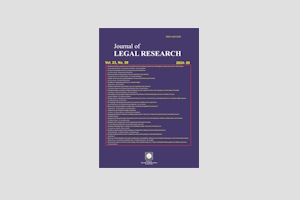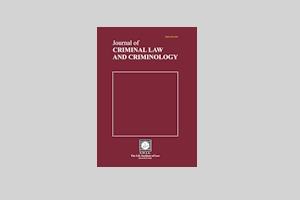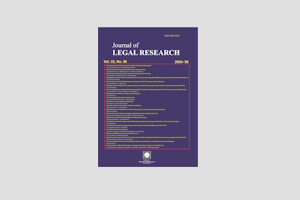Journal of
PRIVATE LAW
Number1
Vol. 1 ● No. 1
September 2013
Managing Editor: Vahid Eshtiagh
Editor-in-Chief: Seyyed Ghasem Zamani
CONTENTS
Choice of Competent Court and Applicable Law on Insolvency of Multinational Enterprises Group
Kourosh Kavyani Baghbadorani; Saideh Ghassemi Moghaddam
Global Regime on Foreign Investment: Challenges and Developments
Hossein Foroughiniya
Purposes and Formation of the Principles of European Contract Law and Comparison with Similar Documents
Mohammadali Khorsandian; Farhad Mohammdi Basir
Passing of Risk in Goods Sold in Transit: A Comparative Study under International Sale of Goods Convention, English Law and Iranian Law
Fakhroddin Asghari Aghmashhadi; Ali Mohammadzadeh
Electronic Arbitration: Procedure and Validity of Awards
Salman Faghih Mirzaei
Third Party’s Contractual Liability
Alireza Yazdanian; Zeynab Kiani
Signature in the Law of Iran
Nader PourArshad
Protection of Child’s Rights in light of the 1993 Convention on International Adoption
Farhad Parvin; Armaghan Abiri
Choice of Competent Court and Applicable Law on Insolvency of Multinational Enterprises Group
Kourosh Kavyani Baghbadorani
Saideh Ghassemi Moghaddam
Abstract
Multinational enterprises group insolvency is the obvious sample of cross-border insolvency. One of the most important questions in the cross-border insolvency discussion is how to determine the competent court and applicable law. To answer this question, three approaches (universalism, territorialism and contractualism) are brought forth to discussion. However the criteria presenting by these approaches, aren’t in accord with the insolvency state of multinational enterprises group. The diversified and complicated structure of multinational enterprises on the one hand, and their activities in different venues with different legal systems on the other hand, make doubts about determining the appropriate legal system applicable on their activity, especially on their state of Insolvency.
This article attempts to deal with the criteria of these three above mentioned approaches and determine the appropriate legal system which is in accord with the diversified structure of multinational enterprise group. According to the ninth section of Trade Law Bill concerning the International Insolvency, the approach of Iran legislator will be analyzed in this respect.
Keywords
multinational enterprise group cross-border insolvency universalism approach territorialism approach contractualism approach
Global Regime on Foreign Investment: Challenges and Developments
Hossein Foroughiniya
Abstract
Although the 3000 international investment treaties concluded since the end of World War II are separate and distinct international legal instruments, they constitute, as a group, an emerging global regime for investment. Drawing on regime theory from the field of international relations. While having all the characteristics of other international regimes, the investment regime also has three unique features: it has been bilaterally, rather than multilaterally, constructed: it decentralizes and privatizes decision-making processes; and it is not based on a multilateral international organization. All of these features have significant consequences for the functionality and sustainability of the regime. The regime also faces four major challenges: (1) disappointing regime results; (2) perceived defective decision-making process and unjustified constraints on national sovereignty; (3) divergence of participant expectations; and (4) the impact of national and global economic crises. On the other hand, certain other factors tend to give the regime a sticky quality that makes the departure of members difficult. Nonetheless, the international investment regime will require wise management and flexible leadership in the future if it is to withstand these challenges and achieve its potential. This article examines the elements of the international investment regime, the reasons for its development, the goals that it pursues, and the challenges that it faces.
Keywords
bilateral investment treaties international investment regime international organization trade international law Principles norms rules decision making processes economic liberalization enforcement mechanisms international arbitration
Purposes and Formation of the Principles of European Contract Law and Comparison with Similar Documents
Mohammadali Khorsandian
Farhad Mohammdi Basir
Abstract
The publication of a document titled “Principles of European Contract Law” in late Twentieth century as a result of efforts done by the European committee of contract law in an attempt to codifying the principles of private law should be considered as a crucial step towards the improvement of contract law. PECL is after some specific aims though it has some commonalties with documents such as UNIDROIT, PETL, CISG and UCC. The main goals of the formulator of PECL include forming a part of E.U. Draft Common Frame of Reference (forthcoming) providing “a set of Neutral principles” for contract parties and presenting a suitable framework for legislators such as China, Estonia, Netherlands, etc who are after codifying a national law. Hence, our law should be continuously revived according to the newest issues in the realm of law and innovations like PECL and other such as international documents in a way that by considering all related aspects and arriving at an absolute certainty with respect to discrepancies between this document and our legal structure, we can use these documents as pre-formulated source and shortcuts to bridge the existing gaps.
Keywords
PECL PETL UNIDROIT CISG UCC
Passing of Risk in Goods Sold in Transit: A Comparative Study under International Sale of Goods Convention, English Law and Iranian Law
Fakhroddin Asghari Aghmashhadi
Ali Mohammadzadeh
Abstract
Where the goods sold in transit, fixing the moment from which the risk passes is very important for the contracting parties. According to the Convention, The risk passes to the buyer from the time of the conclusion of the contract. In English law, although there is no express regulation in this connection, the governing rule is the general rule inserted in section 20 of Sale of Goods Act that is, the goods remain at the seller’s risk until the property in them is transferred to the buyer. In Iranian law, like English law, there is no express regulation in this connection. The governing law should be the general law in passing of risk. That is, the risk passes to the buyer by delivering of goods to him. But, the contracting parties can agree that the risk should be passed from the time of the conclusion of the contract.
Keywords
International Sale of Goods Convention goods sold in transit risk Delivery
Electronic Arbitration: Procedure and Validity of Awards
Salman Faghih Mirzaei
Abstract
Nowadays, the development of new science and technology has affected the people’s lives in a large scale. E-commerce has progressed with an incredible speed and rising of disputes between parties in electronic transactions like in the traditional way, is inevitable. Electronic and virtual nature of these transactions clarifies the need to accelerate the settlement of conflicts in a way appropriate to the nature of these exchanges and has led to new ways of disputes resolution called Electronic Disputes Resolutions and especially Electronic Alternative Dispute Resolutions. This article first reviews the concept, scope and different kinds of them that are popular in the world and then shows how electronic arbitration – as the most important EDR- could be exerted electronically from starting the proceedings to issue and communicate an electronic award, how we can secure the authenticity of electronic documents and how real providers of documents cold be identified throw special mechanisms. At the end we conclude that since all steps of the procedure are capable of being done electronically, e-arbitration is a completely valid and secure way and we could argue about replacing the traditional arbitration with e-arbitration in some cases.
Keywords
alternative dispute resolutions electronic alternative dispute resolutions electronic arbitration electronic procedure
Third Party’s Contractual Liability
Alireza Yazdanian
Zeynab Kiani
Abstract
Contractual liability vicariously is one types of vicarious liability, although it has not been mentioned in Civil Code of Iran, but it can be deduced from some of articles.
Elicitation and deduction of contractual liability vicariously is crucial since conditions of realization differ between it and non-contractual liability. Therefore its rules and conditions have to be studied separately. On the other hand existence of its institution will cause victim face with two responsible, and with insolvency of responsible he/she is not deprived of compensation. In this paper, it will be discussed.
Keywords
contractual liability Third Party civil code Iran
Signature in the Law of Iran
Nader PourArshad
Abstract
In law, signature has multiple meanings and functions. One of these meanings implies a sign representing the identity of its holder and establishing the validity of the signed document. In considering a document as a proof for a claim, the legislator resorts to the indispensable role of signature. Broadly speaking, signature has always been used to denote either of the two following meanings. While the general meaning includes such things as fingerprint and seal, the specialized meaning refers to the movement of hand to draw a sign. With reference to statute law, legal procedure, and legal doctrine of Iran, the present article deals with the definition, nature, history, elements, conditions, and consequences of signature in the specialized sense.
Keywords
signature seal fingerprint document
Protection of Child’s Rights in light of the 1993 Convention on International Adoption
Farhad Parvin
Armaghan Abiri
Abstract
Regarding that children are one of the most important components of each society, today, the issue of donating the consideration to their rights is an undeniable matter. Accordingly, paying attention to the situations in which, the child maybe abused and effort to restrain, diminish and eliminate this grade of society is a vital pace to protect and support them. Observing the increase of International adoption in recent decades, analyze and study about this matter seems to be so impressive, inventive and important issue that can scrutinize such a new angle of human rights studies (especially children rights era). In this article we try to express some aspects of this phenomenon in convention 1993, in brief.
Keywords
child’s rights Adoption Convention on International Adoption





